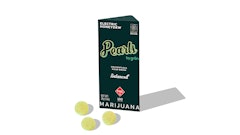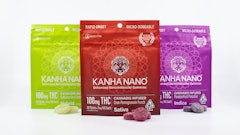
Perusing the offerings at most Canadian cannabis dispensaries, consumers will more often than not find the same products: swaths of flower from different producers, a mix of gummy, cookie, and chocolate edibles (except in Quebec), vapes from the largest publicly traded licensed producers (LPs) and smaller craft producers, a dash of extracts sourced from both the major LPs and smaller provincial providers, a series of capsules, gel caps, and topicals, and let’s not forget the mini-fridge chock-full of infused beverages.
But in the right store in the right market, you might come across more exotic items: maple syrup, garlic chili oil, hazelnut and mocha creamers, Japanese tamari soy sauce, sesame oil, olive oil, truffle oil, garlic chili oil, and hot sauce, all infused with a proprietary THC oil and offered by
Founded by Connor McNamee, Nico Sto Thomas, Brad Quevillon, and Cayli Weinberg, West Blvd, using its Farm + Florist’s branded products, looks to challenge the cannabis industry’s understanding of edible infusions and open the market to inhalable-wary consumers looking for something other than confectionaries.
“We've pushed very hard to be at this specific location in this specific city, doing this specific product category for a very purposeful mission: to support and trailblaze within culinary cannabis hospitality,” McNamee says.
Niche Discovery
Operating some of the first retail stores in B.C., including Vancouver’s first shop under the municipal license program (and second in Canada), McNamee and his co-founders saw the diversity of cannabis consumers who entered their stores. “We got a ton of experience understanding consumers early on before legalization,” McNamee says. “We were shocked to know that we could open up in certain areas and then see such a mix of demographics come into the store and support cannabis or be curious about cannabis.”
The storefront in Vancouver’s Point Grey neighborhood–an extremely affluent area near the University of British Columbia (UBC) campus teeming with boutique shops and unique restaurants–was the most interesting case study for the company founders. After receiving nearly 130 complaints from NIMBY (not-in-my-backyard) neighbors throughout the city, McNamee started noticing that, along with the usual college student suspects, those same complaining Point Grey residents began to enter the store and ask questions about cannabis products.
“The NIMBY people ended up being huge supporters of our business,” McNamee remembers. But even the student crowd was different than what the founders expected. “We started to get chefs of fraternities and sororities coming into our store looking for infused culinary products. I thought that was so interesting.”
Divesting from the retail space, McNamee, Thomas, and Quevillon teamed up with Weinberg to found Farm + Florist and fill that culinary infusion niche. The group found an ideal location in a hybrid commercial/industrial section of Vancouver’s Mount Pleasant neighborhood and focused on creating a product line of infused ingredients.
“We're close to 40-plus listings across Canada through our three brands, and we’re happy with the flower market and how it's turned out,” McNamee shares. “But obviously our main focus and passion comes down to Farm + Florist.”
Developing a Culinary Cannabis Market
One of the first things Farm + Florist’s team noticed with cannabis edibles and infusions was the use of full-spectrum plant ingredients. While this may appeal to cannabis connoisseurs, the strong cannabis odor and taste “didn’t honor the whole cooking side,” McNamee explains. “There might be an opportunity to create a culinary line that supports hospitality ambitions, but is also seamless to use.

Farm + Florist created a line of infused oils, syrups and other products for people to more seamlessly cook with cannabis. Photo by Brian MacIver
“We knew that we needed to have a product line that was going to grow with the industry, that was going to support chefs, support at-home cooks, support people that just wanted take-out and to put stuff in their food,” McNamee continues “So we've built out this ingredient list that is essentially like a tool belt for people that are interested in culinary cannabis.”
Farm + Florist’s infused ingredients come in 60 ml containers and contain 10 mg of THC, dosed out in 2.5 mg servings per tablespoon, and the culinary ingredients hail from around the globe: maple syrup is sourced from Quebec (a product
Weinberg, a Red Seal chef–the trade’s equivalent to a four-year degree–is the head of product development in charge of sourcing ingredients for Farm + Florist. “She spent years building menus, sourcing ingredients, and building dishes for restaurants,” McNamee says. “So it's a natural thing for her to be able to source the correct ingredient.”
Developing new culinary cannabis ingredients is where the Farm + Florist team can have the most fun. The group’s innovation pipeline starts at a conference table, where ideas are bounced around and debated amongst the founders. Some come naturally through conversation, others are based on consumer feedback. For example, the team commissioned a 300-person study from the University of British Columbia to survey potential customers from a wide demographic swath, which found that almost every demographic used olive oil, which spurred Farm + Florist to develop an olive oil infusion.
“And then by requests of the Ontario Board, we've made our products into duos,” McNamee shares with pride. For example, our Trattoria duo–truffle oil and truffle hot sauce–and then our Omakase duo has our sesame oil and our soy sauce. And then our tapas duo has our garlic chili oil and our olive oil.” Duo packages come in two 30 ml bottles each containing 5 mg of THC.
The company also experiments with seasonal and limited-time offerings (LTOs). Over the holidays, Ontario consumers could purchase a “Mistlestoned” pack, another duo package containing infused hazelnut and infused mocha creamers (this LTO product is no longer available). For 4/20 2024, the Ontario Cannabis Store also ordered a custom hot honey and vanilla honey duo pack. “It's just fun, man,” McNamee says with a grin. “I've done my fair share of selling within the market, and you'll never see the same smile with flower that you get from the culinary oils.”
But to get consumers to purchase their products, the Farm + Florist team also has to show them how to use those infusions. Farm + Florist has created a “digital ecosystem,” as McNamee refers to it, to support its products. For example, the company lists infused recipe ideas on its website to show people how they can integrate these ingredients into an elevated dining or cocktail experience. More digital-first solutions are in the works, as well.
“When you can provide a solution to consumers, and you're making everyone part of your supply chain happy, you have a very motivating product,” McNamee says.
Primed for Growth
Farm & Florist aims to grow alongside the cannabis industry and evolve as cannabis consumers mature
“The provincial government, for a lot of positive reasons, wanted to give the opportunity for Farmgate to … cultivators,” McNamee explains. “I wish cultivators took advantage of that, but they can't. They're hand-tied with the costs. They're usually in rural areas that don't have a lot of foot traffic. It's just a very large expense, and it's a tall ask for a lot of these cultivators. So I'm disappointed, as of now, that processors weren't included in the Farmgate program.”
When regulations allow, the current West Blvd office space will become a storefront and show kitchen
Under its R&D testing license, West Blvd can host sensory testing events and welcome up to 31 participants for taste tests, meal trials, and other product development-related events. Farm + Florist takes these events seriously. “We don't bring a lot of f
Cannabis is used on so many different occasions, whether it’s to wind down at the end of the day, treat health conditions, or elevate other experiences. Farm + Florist is trying to marry cannabis to those special occasions.
“People are very motivated to consume cannabis whether it's holidays, or events, or birthdays, or special occasions,” McNamee says. “So, we need to provide that for them. That's our purpose, that's why we're going to grow within the industry, and that's why we're going to stick around: because we want to be that bridge to hospitality.”



















